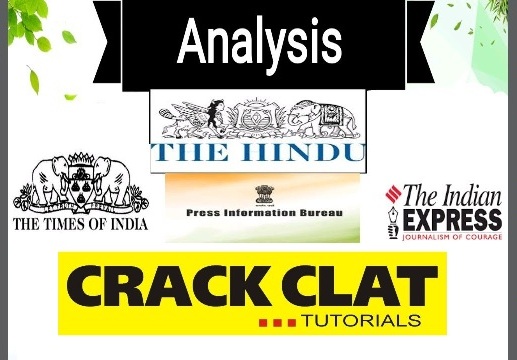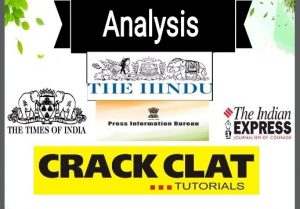Analysis of Important Editorial, Articles & Opinion for CLAT – The correction
Analysis of Important Editorial, Articles & Opinion for CLAT- The correction
Allahabad HC rings a welcome note of constitutional caution against reckless state intrusion on personal life.
CONTEXT:
The Allahabad High Court judgment striking down provisions of the Special Marriage Act, 1954 that make it mandatory for couples to publish a 30-day public notice of their intent to marry—which often exposes them to vigilante and familial violence—is a significant and much-needed correction.
ABOUT:
- Anti-conversion ordinances in Uttar Pradesh and Madhya Pradesh have showed reckless state intrusions on inter-personal relationships in the name of countering “love jihad”. In such a situation, this recent judgement underlined the primacy of individual autonomy.
- The compulsory notice inviting scrutiny and objections encroached on “the fundamental rights of liberty and privacy, including within its sphere freedom to choose for marriage without interference from state and non-state actors, of the persons concerned.”
- The Law Commission of India report in 2012 had made a similar recommendation to “keep a check on the high-handed and unwarranted interference by caste assemblies in sagotra, inter-caste or inter-religious marriages”.
ISSUES:
- A secular state had envisioned the Special Marriage Act, 1954, as a means to clear a space for Indian citizens to marry outside the boundaries of religious and caste identity; to support a refashioning of identity in a society still in thrall to strict endogamy and communitarian identities.
- The public notice gives vigilante groups, families hostile to inter-faith and inter-caste unions, and the social prejudice of legal bureaucracy disproportionate powers to police young couples. As a result, many preferred to convert and marry under personal laws, rather than expose themselves to harassment.
- The Uttar Pradesh Prohibition of Unlawful Conversion of Religion Ordinance, 2020, which makes religious conversion for marriage a crime, has a more draconian version of this provision: It demands a 60-day notice to the district magistrate and a police inquiry to ascertain the “real” intention behind conversion.
Fundamentally wrong:
- Under the Constitution, it is the individual citizen who has and exercises rights and obligations. But these new laws treat religious communities, instead of individual citizens, as basic entities.
- Constitution does address communities when speaking of minority rights and untouchability, it is to only acknowledge and overcome social discrimination because that impedes the ability of those citizens to exercise their rights as individuals.
- Violate privacy, choice rights, the level of state interference in a civil union, which is a solemnisation of a relationship between two individuals, breaches the basic structure of the Constitution.
- Competitive communalism fanning charges of Hindu betis in North India being taken away like cattle, are being relived now. By Prohibition of Unlawful Conversion of Religion Ordinance, 2020.
IS Need for such law?
- NO: Because many other recent ‘laws’ — on slaughter of cattle, marriage, and religious conversions — which taken together, target Muslims, both by denying them shared social spaces and their rights as equal citizens of the republic.
- YES: However, it still allowed intrusion by the state, unlike under personal laws, by demanding notices to be put up in advance, The state of UP is witnessing rising incidents of forced religious conversions or conversions through fraudulent ways.And against allegedly lured and honey-trapped.
Hadiya case judgment, 2017
Justice D.Y. Chandrachud wrote, matters of dress and of food, of ideas and ideologies, of love and partnership are within the central aspects of identity. Neither the State nor the law can dictate a choice of partners or limit the free ability of every person to decide on these matters.
K.S. Puttuswamy or ‘privacy’ judgment, 2017
The Constitution Bench said, autonomy of the individual was the ability to make decisions in vital matters of concern to life.
Lata Singh case, 1994
- The apex court held that India is going through a “crucial transformational period” and the “Constitution will remain strong only if we accept the plurality and diversity of our culture”.
- Relatives disgruntled by the inter-religious marriage of a loved one could opt to “cut off social relations” rather than resort to violence or harassment.
Soni Gerry case, 2018
The SC warned judges from playing “super-guardians”, succumbing to “any kind of sentiment of the mother or the egotism of the father”.
Salamat Ansari-Priyanka Kharwar case of Allahabad High Court, 2020
- The right to choose a partner or live with a person of choice was part of a citizen’s fundamental right to life and liberty (Article 21).
- It also held that earlier court rulings upholding the idea of religious conversion for marriage as unacceptable are not good in law.
CONCLUSION:
- The anti-conversion ordinance in UP has disastrous consequences for the hard-won freedoms of young women and men.
- The Allahabad High Court judgment is a reminder and a warning that the constitution remains the bulwark against an overreaching state.
- Inter-religious marriages may be less than 2.5% of all marriages they put state power and the law itself behind majoritarian communal biases which empower regressive social mores governing marriage and fellowship.
- Unfairly treating all women in the same way and Reconversion to a person’s previous religion is not illegal. It may increase communal violence.
Tag:current affairs

